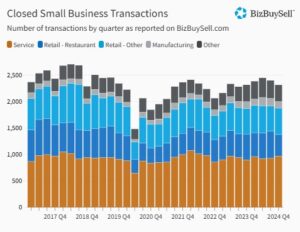2024 was a dynamic year for small business transactions, with a 5% growth in acquisitions, driven largely by higher-priced deals and a steady demand from buyers. BizBuySell’s annual Insight Report sheds light on key market trends, industry-specific growth, and the factors shaping the business-for-sale landscape.
![]()
Market Highlights: Steady Growth and Higher Prices
- Transactions: A total of 9,546 businesses changed hands, with an enterprise value of $7.5 billion—up 15% from 2023.
- Pricing Trends: The median sale price rose 3% year-over-year to $345,000, reflecting strong buyer interest and robust valuation multiples.
- Speed of Deals: The average days on the market dropped to 168 days, a 3% improvement over the previous year.
- Rate Cuts: Despite three Federal Reserve rate cuts, most buyers (60%) reported no change in their purchase timelines due to continued tight lending standards.
Sector-Specific Growth: Leaders and Laggards
The report highlights significant industry-specific trends, with manufacturing, technology, and construction leading the way:
- Manufacturing:
- Transaction growth of 15%.
- Median sale price: $700,000.
- Increased valuations, with cash flow multiples up 9.5%.
- Technology:
- A remarkable 74% increase in acquisitions.
- Median sale price dropped 24% to $650,000, driven by smaller, lower-priced deals.
Construction:
- Transactions rose 10%.
-
- Median sale price: $760,000, reflecting stable valuations.
In contrast, retail, service, and restaurant sectors saw flat growth, with a collective median sale price of $280,000.

Economic Challenges: Inflation and Tariffs
Inflation remained a challenge in 2024, flattening financial performance for many small businesses:
- Median cash flow fluctuated, dropping 7% in Q1 and ending the year with a 7% decline in Q4.
- Rising operational costs, including goods, insurance, payroll, and energy, hit 78% of business owners.
Adding to these pressures, anticipated tariffs from the Trump administration sparked concern. Nearly half of small business owners expressed worry about rising costs, with 20% indicating they would pass these expenses to customers.
The Role of AI and Reshoring in Business Growth
Emerging technologies like AI tools and the shift towards reshoring have positioned manufacturing and technology sectors for continued growth. AI adoption by business owners has surged, with 76% leveraging it for marketing, 45% for analytics, and 41% for customer service.
“Online and manufacturing industries offer opportunities to merge tangible goods with scalable technology,” one buyer noted, emphasizing the long-term potential of these sectors.
Looking Ahead: Buyer and Seller Sentiments
With election-related uncertainty behind them, both buyers and sellers are ready to act in 2025:
- Sellers are motivated by retirement (38%) and high valuations (21%), while some are exiting due to burnout (18%).
- Buyers are focusing on recession-resistant and stable businesses, with many viewing acquisitions as a path to long-term growth.
Creative financing options, such as seller financing and earn-outs, will remain critical in a market where tight lending conditions persist.
As the market evolves, entrepreneurs and investors alike are adapting to challenges and seizing new opportunities. Whether you’re looking to transition out of a business or find the right one to acquire, the landscape remains vibrant and full of potential for those ready to take the next step.

